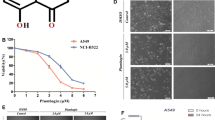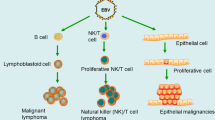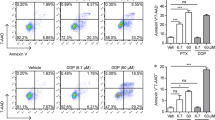Abstract
Apoptin is a nonstructural viral protein encoded by VP3 gene of chicken anemia virus, which could specially induce apoptosis of tumor cells. However, the mechanism of apoptin-induced apoptosis in tumor cells without any side effects in normal cells has not yet been well characterized. This study aimed to investigate the molecular mechanism underlying the selective antitumor effects of apoptin. HepG2 cells were treated with apoptin or transfected with apoptin expression vector. Heat shock protein 70 (HSP70) expression was examined by Western blot. The binding of apoptin to HSP70 promoter was detected by electrophoretic mobility shift assay, chromatin immunoprecipitation, and luciferase assay. The results showed that apoptin inhibited HSP70 expression in HepG2 cells and apoptin-induced apoptosis of HepG2 cells was dependent on the expression level of HSP70. Furthermore, apoptin promoted HSF1 trimer depolymerization and inhibited HSF1-mediated HSP70 transcription. In addition, apoptin competed with HSF1 to bind heat shock element in HSP70 promoter, leading to reduced HSP70 transcription. Both these mechanisms contribute to the suppression of HSP70 transcription and expression. Our findings provide the first evidence that apoptin induces tumor cell apoptosis by specifically downregulating the expression of HSP70, which helps explain the specific antitumor effects of apoptin.





Similar content being viewed by others
References
Backendorf C, Visser AE, Boer AG, et al. Apoptin: therapeutic potential of an early sensor of carcinogenic transformation. Annu Rev Pharmacol Toxicol. 2008;48:143–69.
Tavassoli M, Guelen L, Luxon BA, et al. Apoptin: specific killer of tumor cells. Apoptosis. 2005;10:717–24.
Los M, Panigrahi S, Rashedi I, et al. Apoptin, a tumor-selective killer. Biochim Biophys Acta. 2009;1793:1335–42.
Pietersen A, Erkeland SJ, Rutjes SA, et al. Continuous apoptin expression in transgenic mice does not interfere with lymphocyte development and proliferation. J Med Mol Biol. 2005;2:321–30.
Zhang YH, Leliveld SR, Kooistra K, et al. Recombinant apoptin multimers kill tumor cells but are nontoxic and epitope-shielded in a normal-cell-specific fashion. Exp Cell Res. 2003;289:36–46.
Pavet V, Portal MM, Moulin JC, et al. Towards novel paradigms for cancer therapy. Oncogene. 2011;30:1–20.
Hanahan D, Weinberg RA. The hallmarks of cancer. Cell. 2000;100:57–70.
Oro C, Jans DA. The tumour specific pro-apoptotic factor apoptin (Vp3) from chicken anaemia virus. Curr Drug Targets. 2004;5:179–90.
Heilman DW, Teodoro JG, Green MR. Apoptin nucleocytoplasmic shuttling is required for cell type-specific localization, apoptosis, and recruitment of the anaphase-promoting complex/cyclosome to PML bodies. J Virol. 2006;80:7535–45.
Poon IK, Oro C, Dias MM, et al. Apoptin nuclear accumulation is modulated by a CRM1-recognized nuclear export signal that is active in normal but not in tumor cells. Cancer Res. 2005;65:7059–64.
Los M, Panigrahi S, Rashedi I, et al. Apoptin, a tumor-selective killer. Biochim Biophys Acta. 2009;1793:1335–42.
Maddika S, Panigrahi S, Wiechec E. Unscheduled Akt-triggered activation of cyclin-dependent kinase 2 as a key effector mechanism of apoptin’s anticancer toxicity. Mol Cell Biol. 2009;29:1235–48.
Burek M, Maddika S, Burek CJ, et al. Apoptin-induced cell death is modulated by Bcl-2 family members and is Apaf-1 dependent. Oncogene. 2005;25:2213–22.
Maddika S, Booy EP, Johar D, et al. Cancer-specific toxicity of apoptin is independent of death receptors but involves the loss of mitochondrial membrane potential and the release of mitochondrial cell-death mediators by a Nur77-dependent pathway. J Cell Sci. 2005;118:4485–93.
Lin B, Kolluri SK, Lin F, et al. Conversion of Bcl-2 from protector to killer by interaction with nuclear orphan receptor Nur77/TR3. Cell. 2004;116:527–40.
Oorschot AAD, Voskamp P, Seelen MC, et al. Human death effector domain-associated factor interacts with the viral apoptosis agonist apoptin and exerts tumor-preferential cell killing. Cell Death Differ. 2004;11:564–73.
Beere HM. Stressed to death: regulation of apoptotic signaling pathways by the heat shock proteins. Sci STKE. 2001;2001: re1.
Mosser DD, Morimoto RI. Molecular chaperones and the stress of oncogenesis. Oncogene. 2004;23:2907–18.
Yang X, Wang J, Zhou Y, et al. Hsp70 promotes chemoresistance by blocking Bax mitochondrial translocation in ovarian cancer cells. Cancer Lett. 2012;321:137–43.
Tao ZH, Liu XH, Zhang YW, et al. Expression of TAT-apoptin fusion protein and its anti-tumor activity. Chin J Biochem Mol Biol. 2006;22:535–41.
Pirkkala L, Nykanen P, Sistonen L. Roles of the heat shock transcription factors in regulation of the heat shock response and beyond. FASEB J. 2001;15:1118–31.
Evans CG, Chang L, Gestwicki JE. Heat shock protein 70 (hsp70) as an emerging drug target. J Med Chem. 2010;53:4585–602.
Yenari MA, Liu I, Zheng Z, et al. Antiapoptotic and anti inflammatory mechanisms of heat-shock protein protection. Ann N Y Acad Sci. 2005;1053:74–83.
Acknowledgments
This study was supported by the funds from Natural Science Foundation of Heilongjiang (QC2011C071), Dr. Wu Liande Fund (WLD-QN1110), and Heilongjiang Science and Technology Project Fund.
Conflicts of interest
None
Author information
Authors and Affiliations
Corresponding author
Rights and permissions
About this article
Cite this article
Yuan, L., Zhang, L., Dong, X. et al. Apoptin selectively induces the apoptosis of tumor cells by suppressing the transcription of HSP70. Tumor Biol. 34, 577–585 (2013). https://doi.org/10.1007/s13277-012-0585-y
Received:
Accepted:
Published:
Issue Date:
DOI: https://doi.org/10.1007/s13277-012-0585-y




